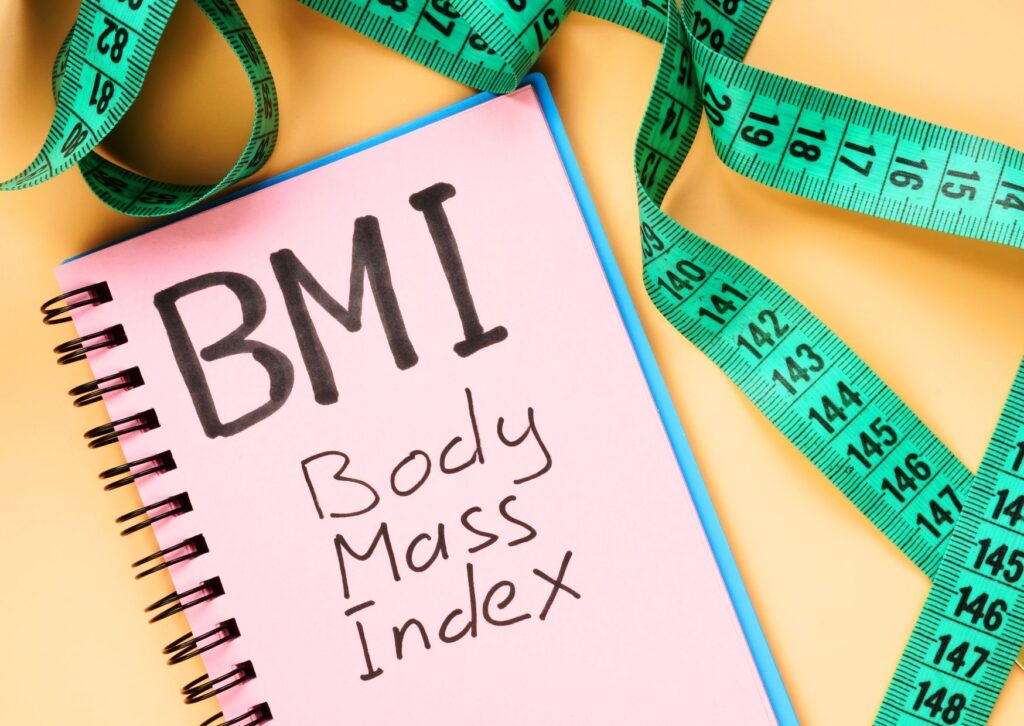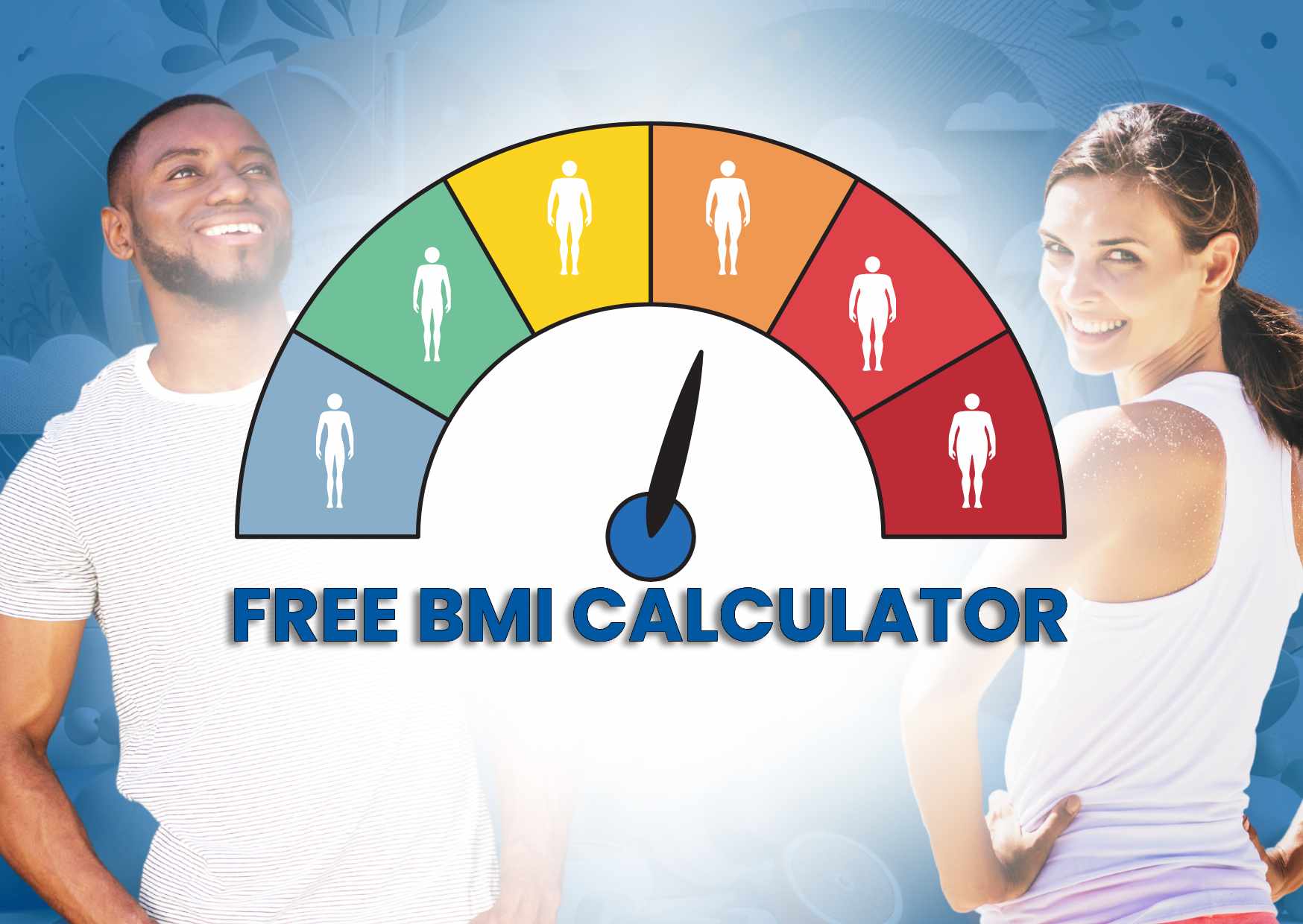FREE Body Mass Index (BMI) Calculator
In this blog we’ll be talking about all things BMI.
You’ll be able to check your Body Mass Index (BMI) with our FREE BMI Calculator.
We’ll discuss who is best suited to using a BMI Calculator, as well as some actionable tips to help if you’re not in the ideal weight range.
Contents
Who Should Use a BMI Calculator?
Who Shouldn’t Use a BMI Calculator?
- Underweight (BMI less than 18.5)
- Normal Weight (BMI 18.5 to 24.9)
- Overweight (BMI 25 to 29.9)
- Obese (BMI 30 and above)
Next Steps After Your BMI Calculation
Health Risks Associated with High and Low BMI

Who Should Use a BMI Calculator?
A BMI calculator is a useful tool for the general adult population seeking a quick assessment of their body mass index, which can serve as an initial indicator of their overall health status.
It’s particularly beneficial for individuals who are neither pregnant nor athletes, and who wish to understand where they stand in terms of weight categories defined by health organisations.
This includes people looking to monitor their weight over time, or those starting on a journey towards a healthier lifestyle who need a baseline measurement.
Additionally, healthcare professionals might use BMI calculations as a conversation starter about a patient’s health risks related to weight and to track weight changes.
However, it’s crucial for users to complement BMI insights with other health assessments and professional advice for a comprehensive understanding of their health.

Who Shouldn’t Use a BMI Calculator?
While a BMI calculator offers a quick glance at one’s body mass index, it’s not a one-size-fits-all tool.
Specifically, athletes with dense muscle mass might find the results misleading, as BMI doesn’t differentiate between muscle and fat.
Similarly, pregnant women, whose body composition changes significantly, should steer clear of using BMI as a health measure during this period.
Children and the elderly also cannot rely on a BMI Calculator.
Their body composition and growth patterns require a more nuanced approach to health assessment.
Furthermore, individuals with a high muscle to fat ratio, like bodybuilders, may receive an ‘overweight’ or ‘obese’ result, which inaccurately reflects their actual health status.
In essence, if you fall into these groups, a BMI calculator might not provide the accurate health insights you need, and consulting with a healthcare professional is a more reliable route to understanding your health.

FREE BMI Calculator
BMI Calculator
BMI Scale Chart
BMI Scale Chart
| Category | BMI Range |
|---|---|
| Underweight | Less than 18.5 |
| Normal weight | 18.5–24.9 |
| Overweight | 25–29.9 |
| Obese | 30 or more |
Understanding Your BMI Result
When you use a BMI calculator, the result you get places you within one of four major categories.
Each category provides a general indication of your health status regarding your weight, but remember, BMI is just a starting point.
Here’s what your BMI result signifies:
Underweight (BMI less than 18.5)
Falling into the underweight category might indicate that you’re not consuming enough calories to meet your body’s energy needs.
However, or it could be due to high metabolism, health conditions, or genetics.
Being underweight can lead to weakened immunity, osteoporosis, and fertility issues.
It’s advisable to consult a healthcare provider to explore the reasons and possibly adjust your nutrition and health plan.
Normal Weight (BMI 18.5 to 24.9)
A BMI in this range suggests you have a healthy weight for your height.
This category is associated with a lower risk of chronic diseases related to overweight and obesity.
Maintaining a balanced diet and regular physical activity will help you stay within this healthy range.
Overweight (BMI 25 to 29.9)
This result means you may be carrying excess weight for your height.
Being overweight can elevate your risk for several health conditions, including heart disease, type 2 diabetes, high blood pressure, and certain cancers.
Consider consulting with a healthcare professional to discuss possible lifestyle adjustments or interventions.
Obese (BMI 30 and above)
A BMI in the obese range significantly increases your risk of various health issues, such as metabolic syndrome, cardiovascular diseases, and joint problems.
It’s crucial to seek medical advice to manage obesity, which might include dietary changes, increased physical activity, and possibly medical interventions.
Next Steps After Your BMI Calculation
Remember, while BMI is a useful tool for assessing weight-related health risks, it doesn’t paint a complete picture of your health.
Factors like muscle mass, ethnic background, gender, and age can influence the accuracy of BMI as a health measure.
Here’s what you can do after getting your BMI result:
Seek Professional Advice
A doctor or healthcare professional can offer health assessment beyond your BMI, considering factors like diet, fitness level, and family history.
Contact your GP or local health professional for some advice.
Set Realistic Goals
Whether it's adjusting your diet, increasing physical activity, or seeking support for eating disorders, setting achievable goals is crucial.
Goals help to give you something to aim towards which can help with consistency and motivation.
Create Healthy Habits
Creating health habits helps us to stay on track with our goals and health journey.
We’ve got a fantastic blog below that can help you create the habits that will improve your health.
“4 Steps to Create Life Changing Habits”
Understanding your BMI result is the first step toward making informed decisions about your health.
Remember, the ultimate goal is overall wellbeing, not just fitting into a specific weight category.

Health Risks Associated with High and Low BMI
Understanding the health implications of both high and low BMI (Body Mass Index) is crucial for taking proactive steps towards better health.
BMI, while a simple and quick indicator, can highlight potential health risks when significantly above or below the normal range.
Risks of High BMI
A high BMI falls into the overweight or obese categories and is associated with an increased risk of several serious health conditions:
• Cardiovascular Diseases: Including heart disease, high blood pressure, and stroke, as excess weight puts additional strain on the heart and blood vessels.
• Type 2 Diabetes: Higher body fat can lead to insulin resistance, significantly increasing the risk of developing type 2 diabetes.
• Certain Cancers: Being overweight or obese is linked to an increased risk of certain types of cancer, including breast, colon, and endometrial cancer.
• Joint and Bone Disorders: Conditions such as osteoarthritis are more common in individuals with high BMI, due to the extra pressure on joints and bones.
• Sleep Apnea: Excess weight can interfere with breathing, leading to sleep apnea and other respiratory issues.
Risks of Low BMI
A low BMI, categorised as underweight, also carries health risks, though they are often less discussed:
• Malnutrition: Underweight individuals may not be consuming enough nutrients, leading to malnutrition, vitamin deficiencies, and anemia.
• Immune System Weakness: Insufficient nutrition can weaken the immune system, making the body more susceptible to infections.
• Osteoporosis: A lower BMI is associated with reduced bone mass, increasing the risk of osteoporosis and fractures.
• Fertility Issues: In women, being significantly underweight can affect menstrual cycles and fertility.

In conclusion, while the BMI calculator serves as a useful tool for a quick assessment of one's weight relative to height, it's important to remember that it is not the most accurate measure of overall health.
BMI does not differentiate between muscle and fat mass and doesn't account for variations in physical characteristics across different individuals and populations.
Health, indeed, is a multifaceted concept that encompasses not just physical but also mental, emotional, and social wellbeing.
We encourage our readers to view BMI as just one piece of the broader health picture.
For a comprehensive health evaluation, it's essential to consult your doctor who can consider the range of factors that contribute to your wellbeing.
Pursuing a healthy lifestyle is about finding balance and wellness in all aspects of life, far beyond what any single number can convey.
If you'd like a health challenge to help you get started, check out our "7-Day Wellness Challenge"
Author
Tyler Lowe – Health & Wellbeing Speaker
BSc Sport & Exercise Rehabilitation


